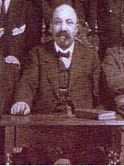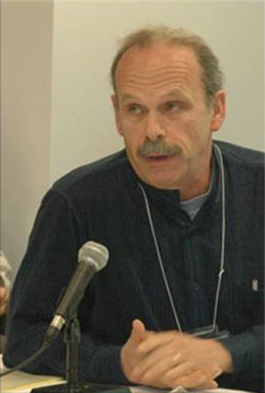Related Research Articles

Abraham Sutzkever was an acclaimed Yiddish poet. The New York Times wrote that Sutzkever was "the greatest poet of the Holocaust."

Chaim Grade was one of the leading Yiddish writers of the twentieth century.

Chava Alberstein is an Israeli musician, lyricist, composer, and musical arranger. She moved to Israel in 1950 and started her music career in 1964. Alberstein has released over sixty albums in Hebrew, English, and Yiddish. She is known for her liberal activism and advocacy for human rights and Arab-Israeli unity, which has sometimes stirred controversy, such as the ban of her song "Had Gadya" by Israel State Radio in 1989. Alberstein has received numerous accolades, including the Kinor David Prize, the Itzik Manger Prize, and honorary doctorates from several universities.

Chava Rosenfarb was a Holocaust survivor and Jewish-Canadian author of Yiddish poetry and novels, a major contributor to post-World War II Yiddish Literature.

Itzik Manger was a prominent Yiddish poet and playwright, a self-proclaimed folk bard, visionary, and 'master tailor' of the written word. A Jew from Bucovina, Manger lived in Romania, Poland, France, England, the US, Canada (Montreal) and finally Israel.

Itsye Mordkhe Schaechter was a leading Yiddish linguist, writer, and educator who spent a lifetime studying, standardizing and teaching the language.

Yankev-Meyer Zalkind was a British Orthodox rabbi, an anarcho-communist, a close friend of Rudolf Rocker, and an active anti-militarist.

Aaron Zeitlin was a Jewish American educator and writer. He authored several books on Yiddish literature, poetry and parapsychology.
Rajzel Żychlińsky was a Polish-born writer of poetry in Yiddish. She published seven collections over six decades. Her first two collections were published in Warsaw, Poland in 1936 and 1939, just prior to World War II. She survived the war by fleeing eastward to the Soviet Union, but many members of her immediate family were murdered in the Holocaust. Her postwar poetry, mostly written in the United States, was strongly influenced by these events.

Jonas Turkow was an actor, stage manager, director and writer. He received the Itzik Manger Prize for his contributions to Yiddish letters.
Sambatiyon, a kleynkunst company founded in Vilna, Poland in June 1926, was called by its founders a "Jewish literary-artistic revue theater." Sambatiyon's founder, Yitshkhok Nozhik, wrote: "Clumsy American produced operettas, which are mostly melodramas or complete tragedies with song and dance, no longer interest our audience. Also, our actors want to be free of the type of theater in which simultaneously act and sing and dance in the same role." An evening at revi-teater consisted of 10-12 one-act plays, skits, and songs, with an intermission.

Joshua A. Fogel is an American-Canadian Sinologist, historian, and translator who specializes in the history of modern China, especially focusing on the cultural and political relations between China and Japan. He has held a Tier 1 Canada Research Chair at York University in Toronto since 2005. Before that he taught at Harvard University (1981-1988) and the University of California, Santa Barbara (1989-2005). He is a fellow of the Royal Society of Canada.
Rivka Basman Ben-Hayim was a Lithuanian-born Israeli Yiddish poet and educator. She was the recipient of the Itzik Manger Prize in 1984. Basman was also awarded the Chaim Zhitlowsky Prize in 1998.
Eliyahu "Elye" Spivak was a Soviet Jewish linguist, philologist, and pedagogue.
Jacob Marinoff was a Russian-born American Yiddish publisher and author. He was one of the founders of New York satirical weekly Der Groyser Kundes. He published three volumes of verse, and co-edited a satire collection.

Abraham Shalom Friedberg, known also by the pen name Har Shalom and the acronym Hash, was a Russian Jewish Hebrew writer, editor, and translator.
Shifra Kholodenko (1909-1974) was a Russian- and Yiddish-language poet, writer and translator from the Soviet Union.

Jacob Fishman was a Polish-born Jewish American Yiddish newspaper editor and Zionist.
Rukhl Fishman, also spelled Rokhl Fishman was an Israeli poet who wrote in Yiddish. In 1978, she received the Itzik Manger Prize.
References
- ↑ Citron, Murray (2016). "Introduction: The Destiny of a Poem". PaknTrager. Yiddish Book Center. Introduction to Citron's translation of an essay written by Manger. The original essay was published in the Yiddish journal Der veker [The Awakener] in February 1960.
- ↑ Seigenthaler, Katherine (February 20, 1989). "Dina Halpern, 79, a Top Star of Yiddish Theater". Chicago Tribune. Retrieved 13 June 2017.
- ↑ Saxon, Wolfgang (February 19, 2017). "Mordkhe Schaechter, 79, leading author, lecturer on Yiddish". The New York times.
- ↑ "Meyer W. Weisgal Dead at 83". Jewish Telegraphic Agency. September 30, 1977.
- ↑ Weisgal, Meyer (1972). Meyer Weisgal ... so far; an autobiography. London: Weidenfeld and Nicolson. p. 320. ISBN 9780297993735. OCLC 16204852.
Many of my creative urges are generated by anger. This was one of them. I rushed to the President, Zalman Shazar and told him, in Yiddish, that this was indecent, an outrage, provincial, etc. Shazar, it must be remembered, is a scholar in Yiddish, in Hebrew, in Russian, in German, etc. He is one of the most charming writers on the Jewish scene and the burden of the presidency has not obstructed the flow of his pen. I told him that I was prepared, on my own, to establish a Manger Prize for Yiddish Literature if he would accept the honorary chairmanship of the Committee.
- ↑ Roskies, David G.; Wolf, Leonard (2013). "Introduction". The World According to Itzik: Selected Poetry and Prose. Open Road Media. ISBN 9781480440777. Anthology of Manger's writing.
- 1 2 3 4 5 6 "Yiddish Literature". Encyclopedia Judaica. 2008.
Among the most prestigious Israeli Prizes for Yiddish literary and other arts is that named after the great lyric poet Itsik Manger. Its recipients are among the finest Yiddish talents of the period: in 1976 poets Arye *Shamri and Leyzer Aykhenrand; in 1977 poets Hirsh Osherovitsh and Yankev-Tsvi Shargel and the Montreal novelist Yehude Elberg; in 1978 poets Uri Zevi *Greenberg (who wrote in Hebrew and Yiddish), Meyer Shtiker, U.S.-born Rokhl Fishman, novelist Eli *Shekhtman, essayist and editor Mortkhe Shtrigler ( Mordecai *Strigler ), and famed singer Nehamah *Lifshitz; in 1979 Shloyme Rotman, Shimshen Meltser, Shloyme Shenhod, Avrom Zak and novelist Khave Roznfarb [ *Rosenfarb ]. In 1980 Tsvi Ayznman, Yitskhok Yanasovitsh, Nakhmen Rap and Shimen-Yisroel Dunski won the prize.
Online version of the Encyclopedia. - ↑ Fuks, Khayim Leyb (1986). "Yankev Fridman". Leksikon fun yidish-shraybers. Translated by Joshua Fogel. Retrieved 2019-03-19.
- ↑ "Kerler, Yoysef". Jewish Virtual Library . Retrieved 2019-03-12.
- ↑ Goldberg, Ruvn (1986). "Yekhiel Hofer". Leksikon fun yidish-shraybers. Translated by Joshua Fogel. Retrieved 2019-03-19.
- ↑ "Isaiah Spiegel". Library Thing. Short biography of Spiegel.
- ↑ Elis, Benyomen (1986). "Yehuda Elberg". Leksikon fun yidish-shraybers. Translated by Joshua Fogel. Retrieved 2019-03-19.
- ↑ Kerler, Dov-Ber. "Osherovitsh, Hirsh". The YIVO Encyclopedia of Jews in Eastern Europe. Retrieved 2020-07-27.
- ↑ "Guide to the Rukhl Fishman Papers, 1940-1990". Online Archive of California.
- ↑ "Literary evening in honor of Samson Dunsky for having received the Itzik Manger Prize". October 4, 1980. Landing page for an audio recording.
- ↑ Elis, Benyomen (1986). "Zyame Telesin". Leksikon fun yidish-shraybers. Translated by Joshua Fogel. Retrieved 2019-03-19.
- ↑ Diamant, Zaynvl (1986). "Elias Lipiner". Leksikon fun yidish-shraybers. Translated by Joshua Fogel. Retrieved 2019-03-19.
- ↑ "A Note on Avrom Karpinovitsh". The Mendele Review (2015). July 25, 2008.
- ↑ Zipper, Yaakov (2004). Journals of Yaakov Zipper, 1950-1982: The Struggle for Yiddishkeit. McGill-Queen's Press. p. 333. ISBN 9780773571556.
- ↑ Król, Aleksandra (July 20, 2017). "20th anniversary of the death of Professor Chone Szmeruk". Museum of the History of Polish Jews.
- ↑ "Moishe Valdman". Leksikon fun yidish-shraybers. Translated by Joshua Fogel. 1986. Retrieved 2019-03-19.
- ↑ "David E. Wolpe". Jewish Virtual Library.
- ↑ Diamant, Zaynvl (1986). "Yosl Lerner". Leksikon fun yidish-shraybers. Translated by Joshua Fogel. Retrieved 2019-03-19.
- ↑ Elis, Benyomen (1986). "Eliezer Podriachik". Leksikon fun yidish-shraybers. Translated by Joshua Fogel. Retrieved 2019-03-19.
- ↑ "Samuel L. Shneiderman, June 15, 1906 - October 8, 1996". University of Maryland. January 10, 2013. Archived from the original on February 13, 2020. Retrieved February 24, 2019.
- ↑ "Elias Schulman MS Collection". University of Pennsylvania. Retrieved 2019-03-20.
- ↑ Cohen, Nathan (March 1, 2009). "Chava Turniansky". Jewish Women: A Comprehensive Historical Encyclopedia. Jewish Women's Archive.
- ↑ "Yossl Birstein". Institute for the Translation of Hebrew Literature. Retrieved 2019-02-24.
- ↑ "Yonia Fain: With Pen and Paintbrush (2018)" . Retrieved 2019-03-20.
- ↑ "Rafael Chwoles 1913–2002". Lithuanian Art Museum. September 19, 2011.
- ↑ "Lev Berinski". Encyclopedia Judaica. Thomson Gale. 2007.
- ↑ Molisak, Alina; Ronen, Shoshana, eds. (2017). "Contributors". The Trilingual Literature of Polish Jews from Different Perspectives: In Memory of I.L. Peretz. Cambridge Scholars Publishing. p. 383. ISBN 9781527502673. Dan Miron wrote an essay for this book.
- ↑ "Yenta Mash". Words without Borders. Contributor biography.
- ↑ Bush, Lawrence (April 17, 2016). "The Concentration Camp Mime". Jewish Currents.
- ↑ "Deaths MLOTEK, JOSEPH". The New York Times. July 5, 2000.